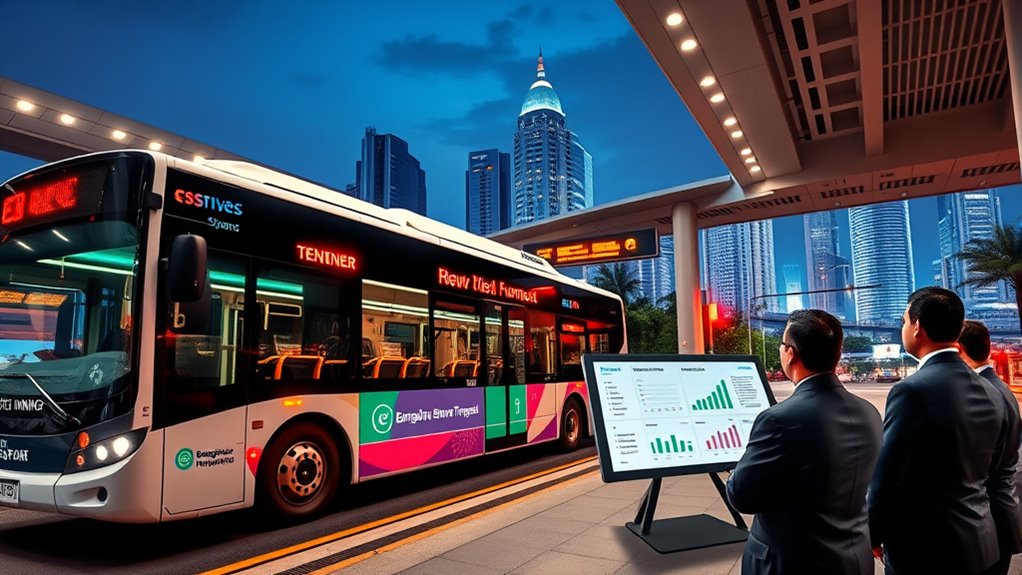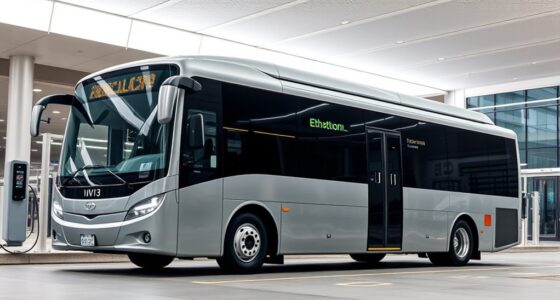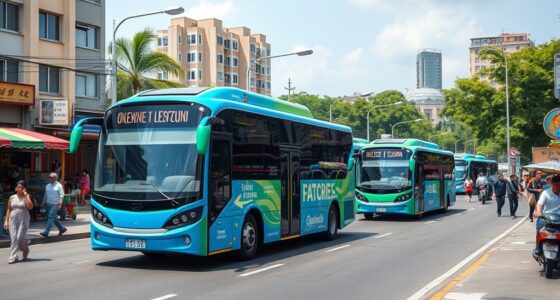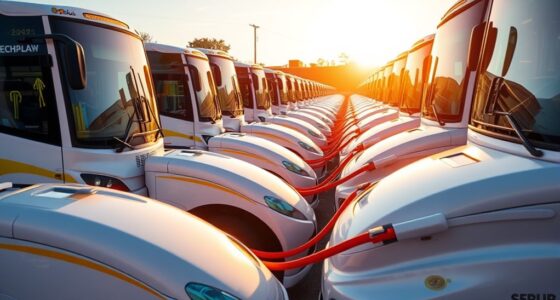Bangalore’s electric bus tender focuses on thorough procurement by emphasizing quality, range, and integrated infrastructure solutions, including charging stations and maintenance facilities. The city’s government offers funding support through subsidies, loans, and grants to help offset initial costs and encourage adoption. This strategic approach aims to guarantee seamless operation and long-term sustainability. If you want to understand how these efforts shape Bangalore’s move toward eco-friendly urban transit, there’s more to discover ahead.
Key Takeaways
- Bangalore’s electric bus tender focuses on integrated procurement of buses and supporting infrastructure like charging stations.
- The initiative offers government subsidies, grants, and financial incentives to reduce upfront costs for operators.
- Bidders must propose comprehensive solutions covering vehicle quality, range, and infrastructure integration for seamless operation.
- Regulatory policies streamline procurement procedures and establish standards for electric vehicle infrastructure development.
- The project aims to enhance urban mobility, promote sustainability, and build a robust electric vehicle ecosystem in Bangalore.
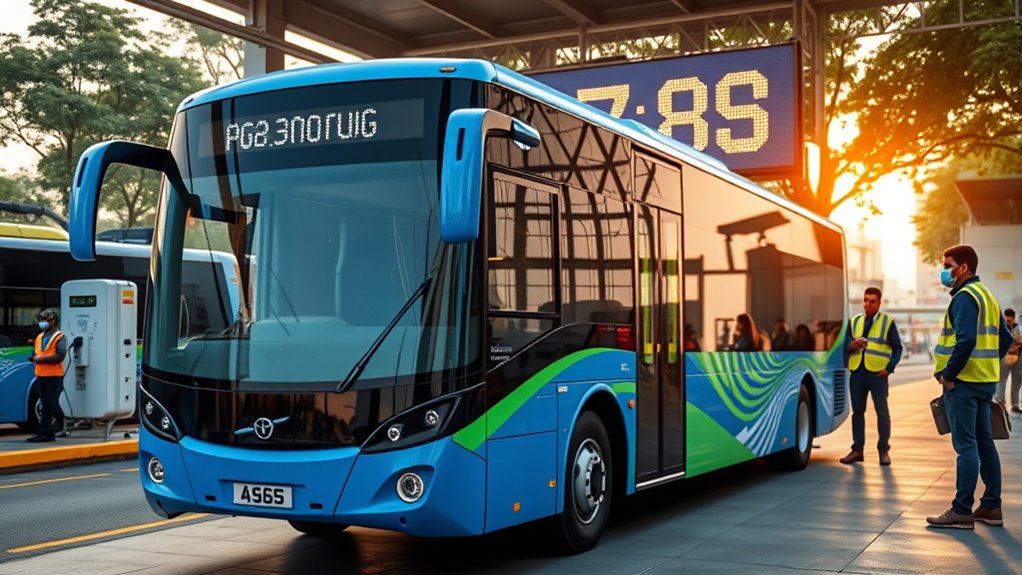
Bangalore has recently announced a new tender for electric buses, aiming to enhance its public transportation system with eco-friendly solutions. This move highlights the city’s commitment to reducing pollution and improving urban mobility. As you explore this tender, you’ll find that a significant focus is on building a robust electric vehicle infrastructure. The city recognizes that efficient charging stations, maintenance facilities, and reliable power supply are essential for the success of an electric bus fleet. This infrastructure not only supports operational efficiency but also encourages more operators and agencies to adopt electric vehicles, knowing that the necessary support systems are in place.
Moreover, government subsidy programs play a pivotal role in making this shift financially viable. These subsidies help offset the higher upfront costs associated with electric buses and charging infrastructure, making it easier for transport operators to upgrade their fleets. If you’re involved in this sector, you’ll see that the government’s incentives aim to stimulate broader adoption by reducing financial barriers. These programs might include direct subsidies, low-interest loans, or grants for infrastructure development, which collectively make electric buses more accessible and attractive for operators.
In the context of the tender, you’ll notice that the procurement process emphasizes not only the quality and range of the electric buses but also the integration of supporting infrastructure. The city is encouraging bidders to propose comprehensive solutions that include charging stations, maintenance facilities, and smart grid integration. This holistic approach guarantees that electric buses can operate seamlessly across Bangalore’s extensive network, minimizing downtime and maximizing efficiency. Additionally, the focus on electric vehicle infrastructure ensures long-term sustainability and operational success for the fleet.
Participation in this tender also involves understanding the regulatory environment shaped by government policies. These policies aim to streamline procurement procedures, provide financial incentives, and establish standards for electric vehicle infrastructure. If you’re a manufacturer or service provider, aligning your offerings with these policies will be key to winning contracts and establishing a foothold in Bangalore’s evolving electric mobility landscape.
Frequently Asked Questions
What Is the Expected Timeline for Electric Bus Deployment?
You can expect electric buses to start deployment within 6 to 12 months, depending on infrastructure progress. As charging stations are installed, buses will undergo testing to guarantee battery lifespan and performance. Keep in mind, delays may occur if charging station deployment lags or battery upgrades are needed. Regular updates will be provided, but overall, you should see electric buses operating on routes within the next year.
How Will the Tender Impact Local Employment Opportunities?
You’ll see a positive impact on local employment opportunities, with estimates suggesting up to 1,000 new jobs created during the electric bus rollout. The tender promotes job creation and skill development, especially in electric vehicle maintenance and manufacturing. As the project progresses, you’ll benefit from increased training programs, making you more competitive in the evolving green transport sector. This initiative is a significant step toward sustainable urban growth and local economic growth.
Are There Plans for Charging Infrastructure Expansion?
Yes, there are plans to expand charging stations and strengthen the power grid. You’ll see more charging stations installed at key locations to support the growing electric bus fleet. This expansion aims to guarantee efficient charging and reduce downtime. The project also involves upgrading the power grid to handle increased energy demands, so you can expect smoother operations and better infrastructure to support electric buses across Bangalore.
What Are the Maintenance Costs for Electric Buses?
Maintenance costs for electric buses are like tending a delicate garden—you’ll mainly spend on battery longevity and charging infrastructure upkeep. Typically, these buses require less maintenance than diesel counterparts, with expenses focused on battery health checks and occasional repairs. As charging infrastructure expands and improves, costs may decrease further. Overall, expect moderate ongoing costs, but remember, investing in quality infrastructure can keep those expenses predictable and manageable, ensuring smooth journeys ahead.
How Does the Tender Compare to Previous Procurement Strategies?
You’ll find that this tender emphasizes fleet modernization with a focus on sustainable transportation, making it more forward-looking than previous strategies. It incorporates innovative funding mechanisms, such as public-private partnerships, to secure necessary investments. Unlike earlier approaches, this tender prioritizes electric buses, aligning with environmental goals. It’s a strategic shift aimed at improving urban mobility, reducing emissions, and ensuring long-term financial sustainability for Bangalore’s transit system.
Conclusion
Your city’s shift to electric buses is a major step toward sustainable transportation. With Bangalore’s recent tender, over 1,000 electric buses are expected to replace diesel counterparts, reducing emissions considerably. This move not only cuts pollution but also demonstrates a strong commitment to eco-friendly mobility. As you witness this transformation, remember that such initiatives can inspire other cities to follow suit, creating a cleaner, greener future for all.
